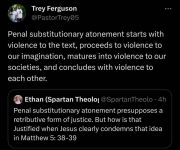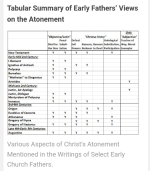- Joined
- Jan 29, 2013
- Messages
- 8,018
- Reaction score
- 54
- Points
- 48
1. Ransom Theory (Origen) -- Jesus's death was a ransom given to the devil in exchange for humanity's freedom.
2. Moral Example Theory (Socinius) -- Both Jesus's life of self-sacrifice, and his martyrdom, were examples for his followers to emulate.
3. Moral Transformation Theory (Abelard) -- Jesus's death is the demonstration of God's love for us, a demonstration so powerful it can change our hearts and turn us back towards God.
4. Satisfaction Theory (Anselm) -- Jesus's death pays back humanity's collective debt to God owed by our injustice.
5. Recapitulation Theory (Irenaeus) -- Through his faithful obedience, Jesus "retells the story" of disobedient Adam and restores what Adam lost.
6. Girardian Theory (Girard) -- Humanity tends to need someone to blame, someone to "sacrifice." Jesus allowed us to do that to him, but through his innocence and resurrection showed the injustice of that whole mechanism.
7. Penal Substitutionary Atonement Theory (Luther/Calvin) -- Jesus suffered the punishment, torment, and death that humanity rightfully would have suffered, due to our legal transgressions against God.
8. Christus Victor (Aulén) -- Jesus's death and resurrection were a liberating victory over the powers that oppress humanity: sin, the devil, and death.
So which Theory (or combination thereof) is/are the only salvific theory/theories? Why isn't the Bible clear on which one is required "to believe"? How do you know the one(s) you choose is the only correctly interpreted one?
2. Moral Example Theory (Socinius) -- Both Jesus's life of self-sacrifice, and his martyrdom, were examples for his followers to emulate.
3. Moral Transformation Theory (Abelard) -- Jesus's death is the demonstration of God's love for us, a demonstration so powerful it can change our hearts and turn us back towards God.
4. Satisfaction Theory (Anselm) -- Jesus's death pays back humanity's collective debt to God owed by our injustice.
5. Recapitulation Theory (Irenaeus) -- Through his faithful obedience, Jesus "retells the story" of disobedient Adam and restores what Adam lost.
6. Girardian Theory (Girard) -- Humanity tends to need someone to blame, someone to "sacrifice." Jesus allowed us to do that to him, but through his innocence and resurrection showed the injustice of that whole mechanism.
7. Penal Substitutionary Atonement Theory (Luther/Calvin) -- Jesus suffered the punishment, torment, and death that humanity rightfully would have suffered, due to our legal transgressions against God.
8. Christus Victor (Aulén) -- Jesus's death and resurrection were a liberating victory over the powers that oppress humanity: sin, the devil, and death.
So which Theory (or combination thereof) is/are the only salvific theory/theories? Why isn't the Bible clear on which one is required "to believe"? How do you know the one(s) you choose is the only correctly interpreted one?




